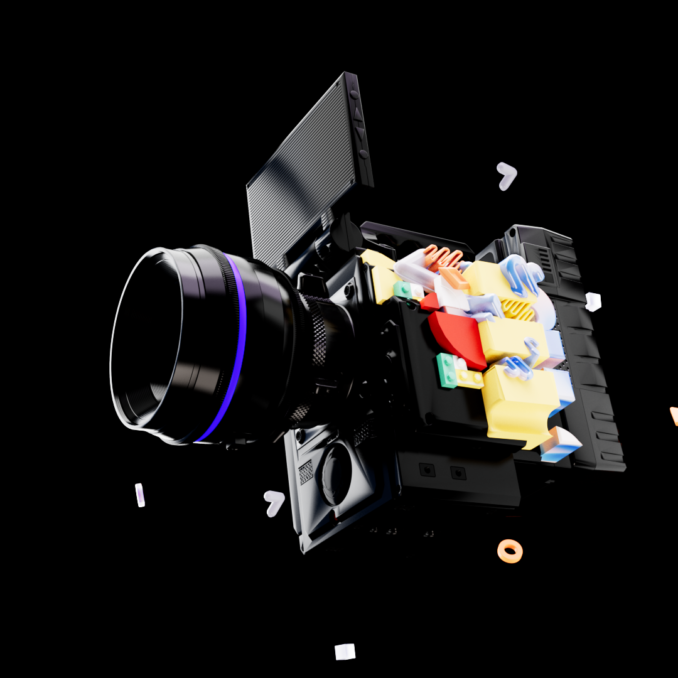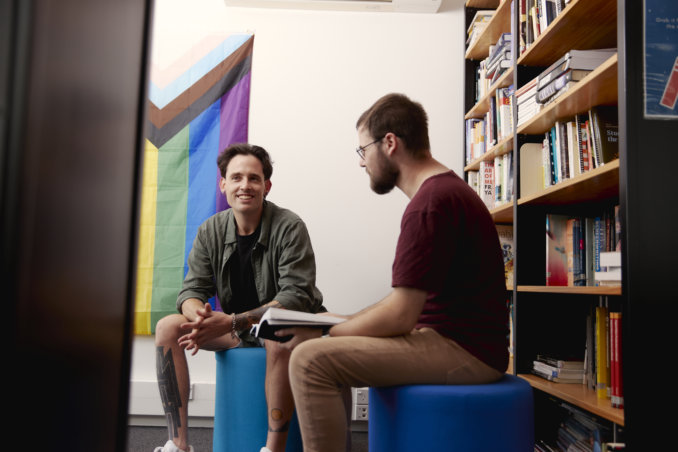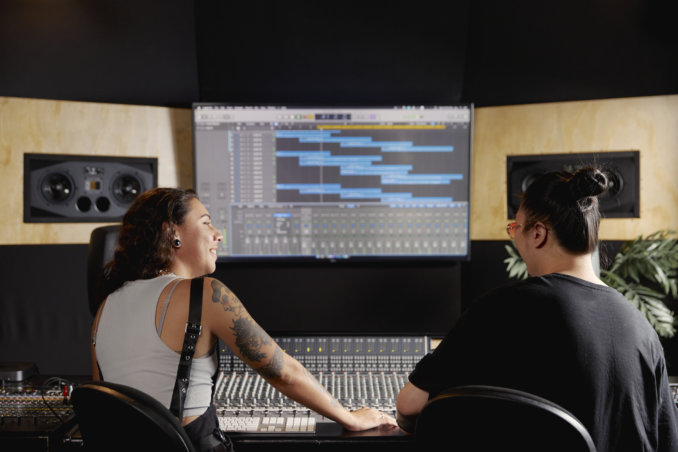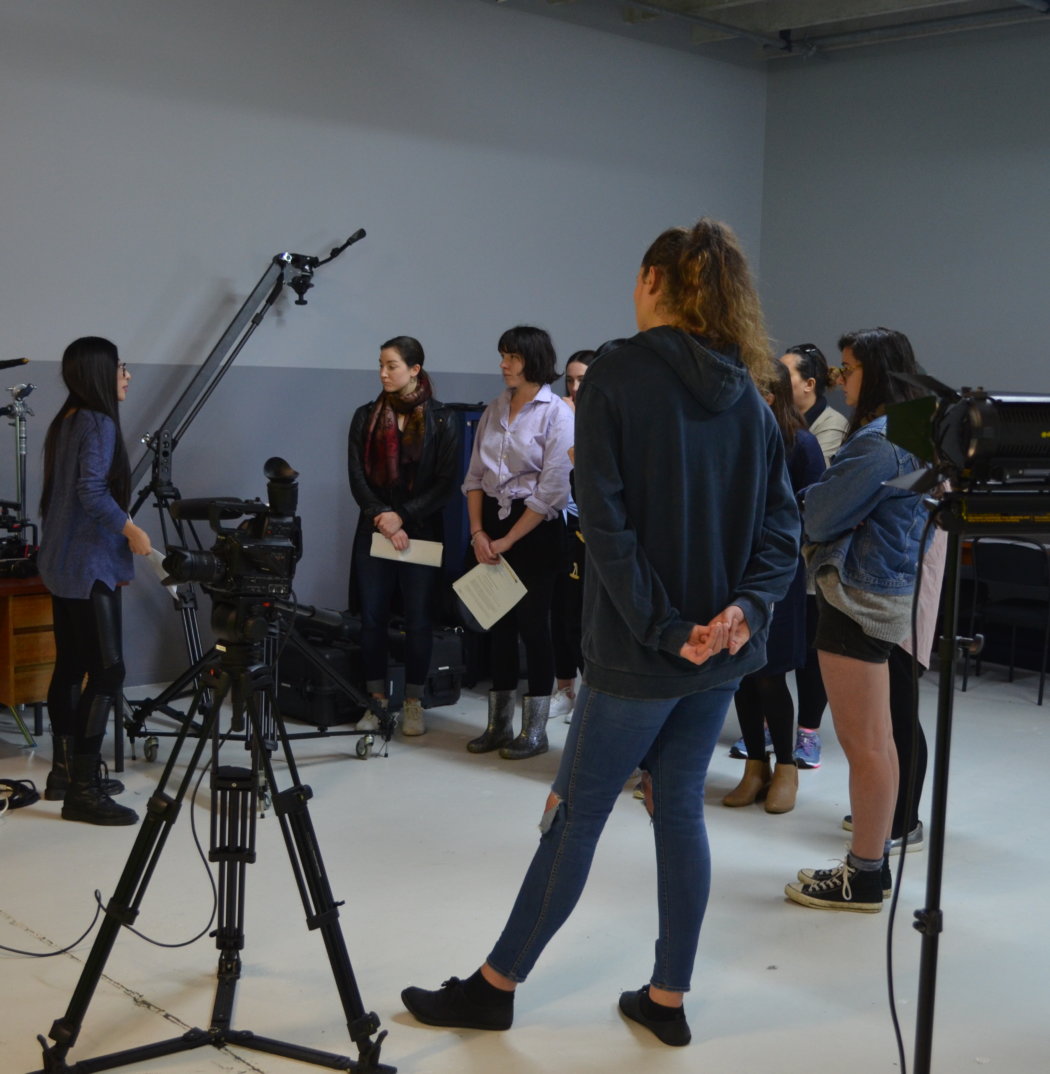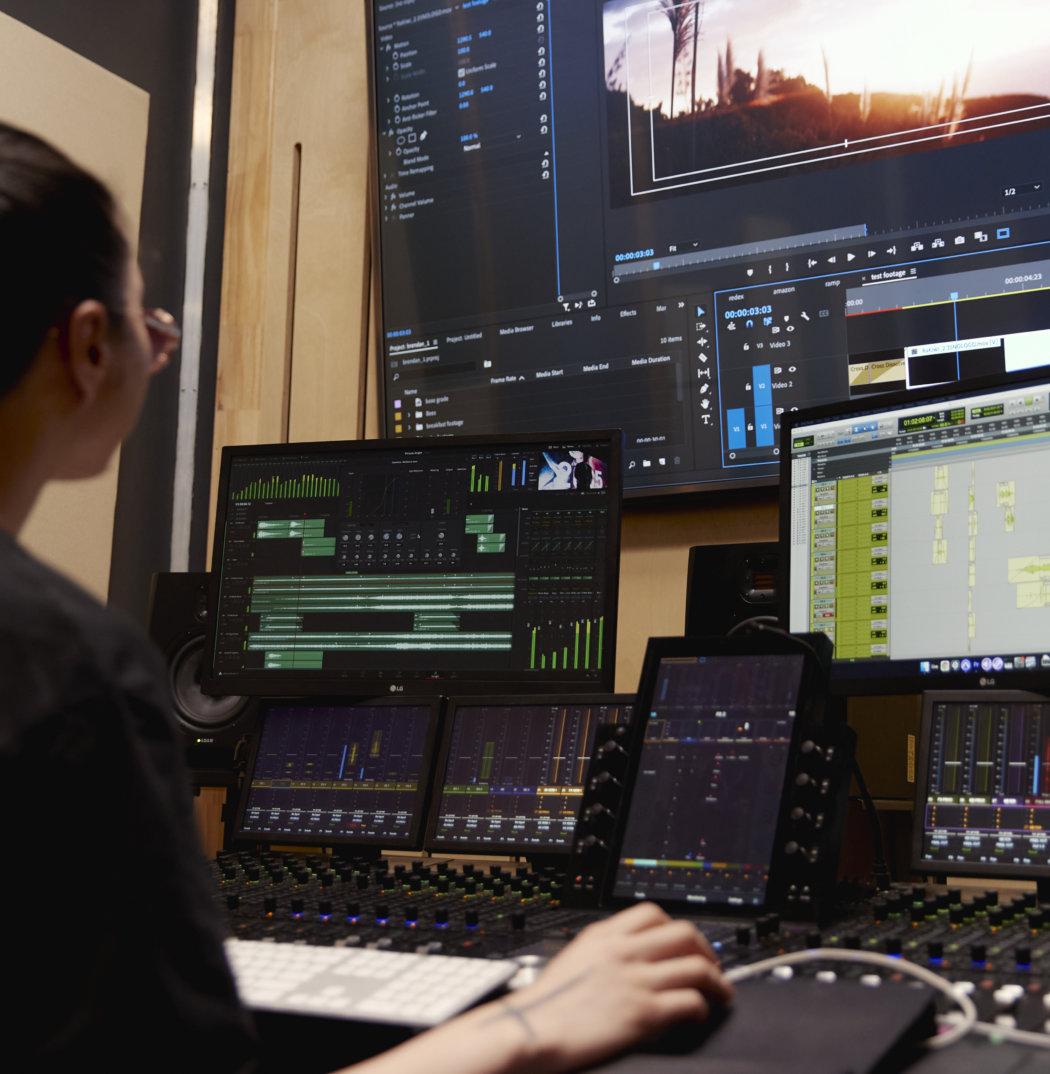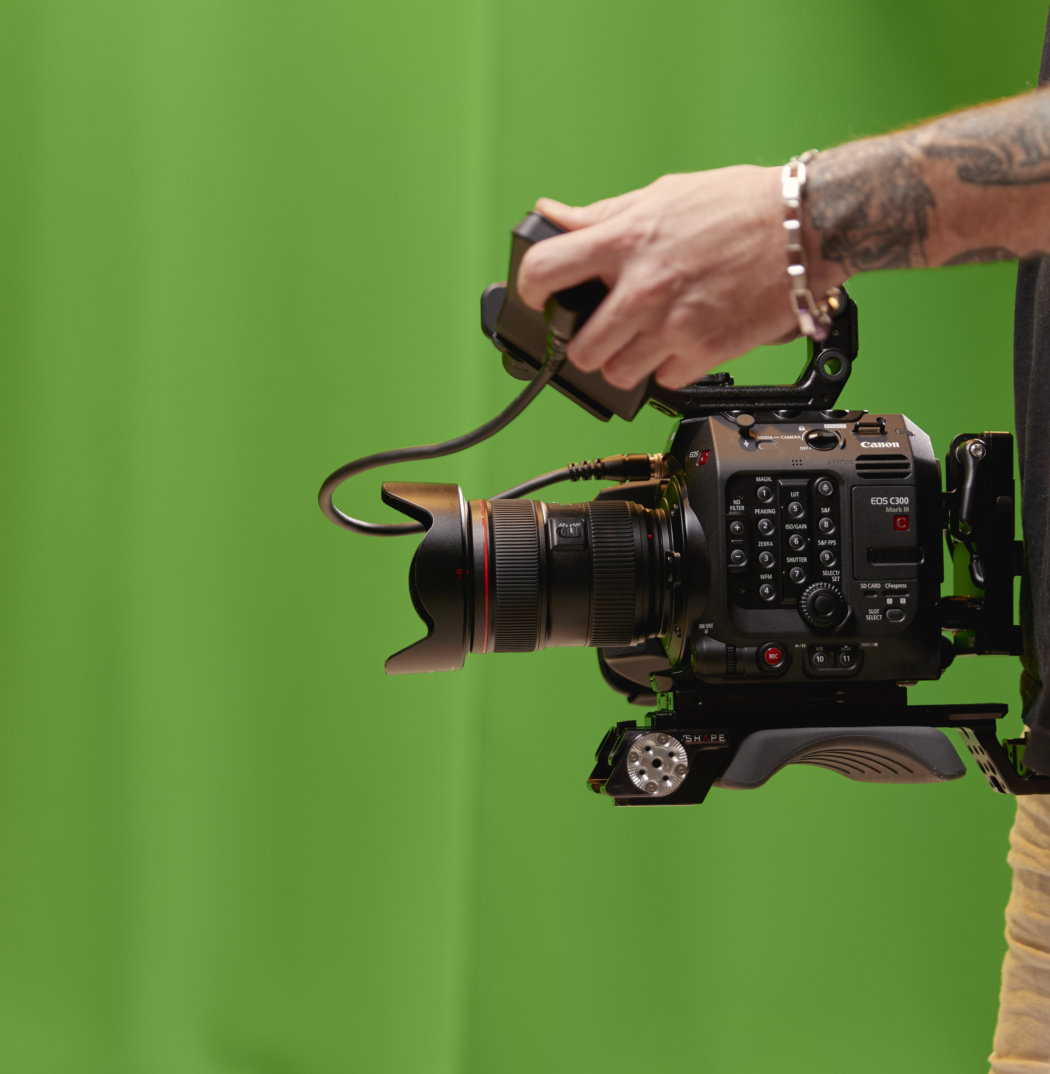Bachelor of Screen Production
LOOK THROUGH THE LENS TO SEE YOUR FUTURE IN FILM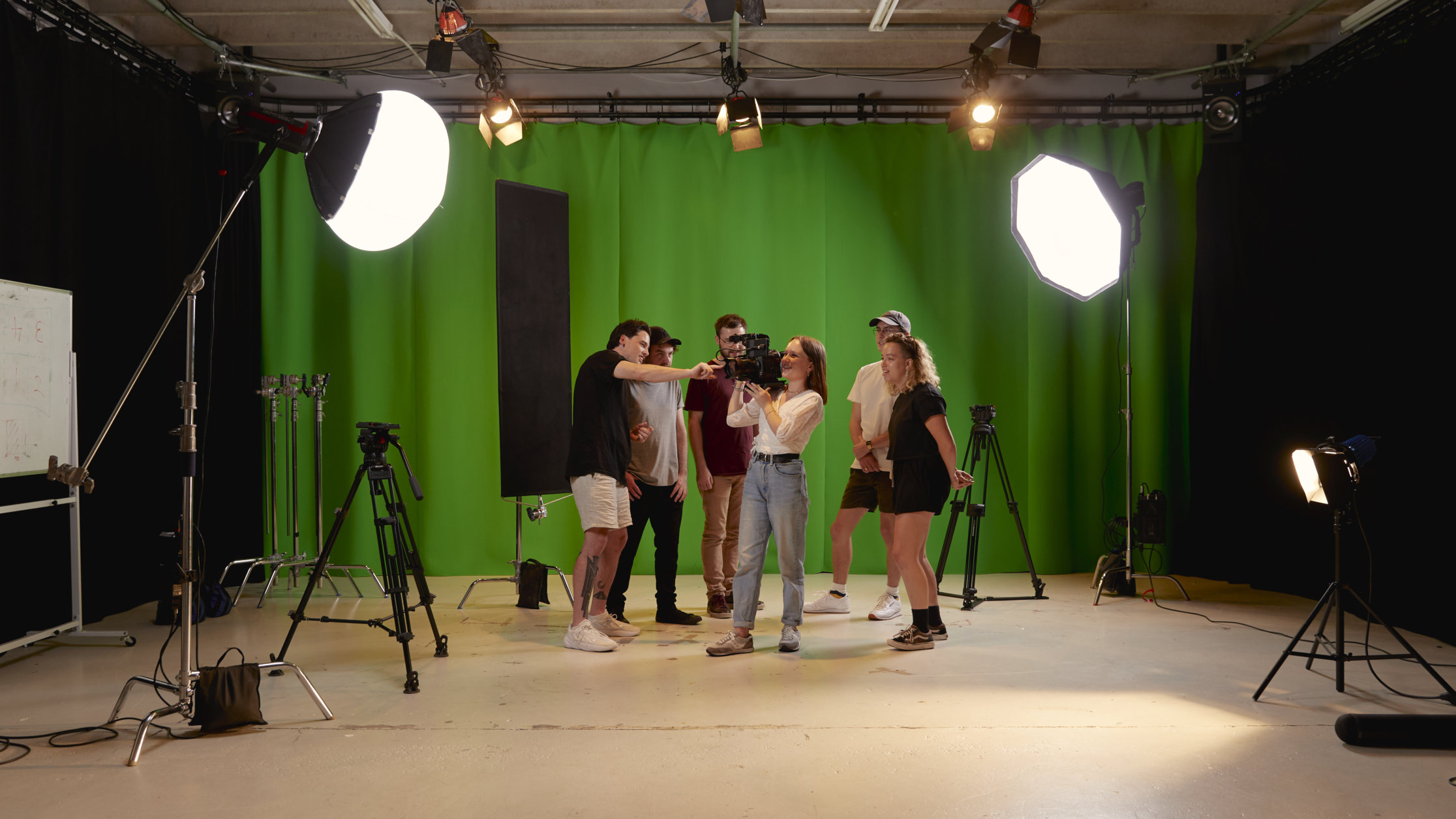
Available at
Auckland
Fees
Bachelor of Screen Production
Domestic Fees
$35,745.19 NZD
- Year One (Level 5)
Administration Fee: $500.00 (one-off fee)
Tuition Fee: $12,555.05 - Year Two (Level 6)
Tuition Fee: $11,137.15 - Year Three (Level 7)
Tuition Fee: $12,052.99
Domestic Students Only
Programme fees may be paid by Student Loan. Fees must be paid annually, prior to the commencement of study.
This programme receives funding from TEC and is NZQA approved, therefore is eligible for the ‘Fees Free’ scheme. To determine your eligibility, visit feesfree.govt.nz
For any queries regarding payment please contact: study@sae.ac.nz
Bachelor of Screen Production
International Fees
$83,811.30 NZD
- Year One (Level 5)
Administration Fee: $500.00 (one-off fee)
Tuition Fee: $28,064.86 - Year Two (Level 6)
Tuition Fee: $27,305.63 - Year Three (Level 7)
Tuition Fee: $28,440.81
Fees must be paid annually, prior to the commencement of study.
For any queries regarding payment please contact: study@sae.ac.nz
Duration(s)
Full time: 3 years
Bachelor
Bachelor of Screen Production
Course Durations
Full time: 3 years
Bachelor
Start Date(s)
Auckland
February 2025
Bachelor of Screen Production
Start Dates
Auckland
February 2025
Entry Requirements
Bachelor of Screen Production
Domestic Entry Requirements
A copy of the student's valid photo ID must be provided.
For Level 7 Degree programmes, candidates are required to have gained a minimum of NCEA Level 3 or equivalent.
Special Admission
Domestic applicants aged 20 years or above who have not met the General Admission or entry requirements for a programme but whose skills, education or work experience indicate that they have a reasonable chance of success may be eligible for Special Admission. Special admission will be granted at the discretion of the Academic Manager or designated nominee. Such applicants may be required to successfully complete a foundation, bridging or tertiary introduction programme as a condition of entry into higher level programmes.
Provisional Admission
Domestic applicants aged under 20 years who have not met the general academic admission and entry criteria for a programme but who can demonstrate a reasonable chance of success through other educational attainment and/or work or life experience may be eligible for provisional entry at the discretion of the Academic Manager. Provisional entry places restrictions on re-enrolment to be lifted if the applicant’s performance is deemed satisfactory by the Academic Manager.
Selection Process
Where there are more applicants than the number of places available a selection process may be applied. An offer of place in a diploma or degree programme would be extended to applicants who meet the entry criteria and demonstrate the potential to successfully complete the programme on the basis of:
A portfolio of work that represents the applicant’s level of achievement.
An interview.
Curriculum vitae (optional).
Applicants who submit a formal application to enrol in the programme, and who meet the entry criteria would be invited to submit a portfolio of work and participate in an interview. The purpose of the interview is to assess the applicants’ suitability for the programme. It will determine whether an applicant is offered a place in the programme, and if so, at what level of the programme the applicant will be offered a place. Applicants would be welcome to enlist whānau support.
Cross Crediting
Cross crediting is at the discretion of the Academic Manager and will be applied in circumstances where a student is transitioning from one programme to another. To ensure the currency of learning, cross crediting of courses will be automatic for any courses undertaken within fives years of the cross crediting.
Application process for RPL or credit transfer
Recognition of Prior Learning (RPL) or credit transfer applies to circumstances where a learner can demonstrate relevant and current knowledge gained through prior learning and/ or a learner is requesting credits to be transferred from a qualification with comparable outcomes.
Applicants who believe they meet the criteria for RPL or credit transfer should complete the application form and attach relevant certified documentation including official academic records and/or evidence of learning outcomes being met through previous work/life experience. An interview may also be conducted with the Academic Manager. Each application will be assessed by relevant academic staff.
An applicant must be a minimum of 17 years at the start date of the programme. Applicants aged less than 18 years old must apply with parental/guardian consent.
All students are given the tutorial and pastoral support needed to satisfactorily engage with the academic and technical demands of the programme, and in particular students entering with the minimum qualification of NCEA Level 2.
All entry is at the discretion of the Academic Manager.
Bachelor of Screen Production
International Entry Requirements
International students seeking admission to SAE must be at least 18 years of age at the time of application.
A copy of the student's valid passport must be provided.
Completion of the equivalent of NCEA Level 3 or University Entrance qualification.
English Language Requirements
International students who are not native English speakers need to provide additional evidence of language skills and complete one of the following:
- International English Language Testing System (IELTS): A band score of 6 or higher (only the Academic Test is accepted), OR
- Test of English as a Foreign Language (TOEFL): A score of 550 or higher (paper based test), 60 or higher (internet based test)
Selection Process
Where there are more applicants than the number of places available a selection process may be applied. An offer of place in a diploma or degree programme would be extended to applicants who meet the entry criteria and demonstrate the potential to successfully complete the programme on the basis of:
- A portfolio of work that represents the applicant’s level of achievement.
- An interview.
- Curriculum vitae (optional).
Applicants who submit a formal application to enrol in the programme, and who meet the entry criteria would be invited to submit a portfolio of work and participate in an interview. The purpose of the interview is to assess the applicants’ suitability for the programme. It will determine whether an applicant is offered a place in the programme, and if so, at what level of the programme the applicant will be offered a place. Applicants would be welcome to enlist whānau support.
All entry is at the discretion of the Academic Manager.
LOOK THROUGH THE LENS TO SEE YOUR FUTURE IN FILM
Film Skills
Understanding pre-production, production and post production
Use a range of production equipment, techniques and technology
Screenwriting and Storyboarding
Critical, Conceptual and reflective thinking, creativity and originality
Research Skills
Directing and Producing
Editing Motion and Sound
Course Structure
The Bachelor of Film is broken up into three distinct levels, each designed to develop different skills.
Level 5
Credit Points: 15
This 36-week course provides a platform for engagement with transferable skills via collaborative client projects which may include contracted roles within projects of more advanced student groups. With a key focus on employability in Aotearoa/New Zealand students engage with professional practice situated in the holistic ideals of Te Ao Maori. Students conduct peer review via the Transferable Skills Matrix in an effort to foster and develop employability skills.
This 36-week course provides a platform for engagement with transferable skills via collaborative client projects which may include contracted roles within projects of more advanced student groups. With a key focus on employability in Aotearoa/New Zealand students engage with professional practice situated in the holistic ideals of Te Ao Maori. Students conduct peer review via the Transferable Skills Matrix in an effort to foster and develop employability skills.
Credit Points: 15
This course brings foundational knowledge of film pre-production, production and post-production blended with an introduction to critical film theory. Using a contextual framework students will develop production skills and knowledge of the film industry in an economic context. Students are introduced to filmmaking equipment, software techniques, storytelling, and intro to screenwriting amongst others.
This course brings foundational knowledge of film pre-production, production and post-production blended with an introduction to critical film theory. Using a contextual framework students will develop production skills and knowledge of the film industry in an economic context. Students are introduced to filmmaking equipment, software techniques, storytelling, and intro to screenwriting amongst others.
Credit Points: 15
In this project students will produce a documentary and consider social contexts of the screen production industry. Students will work in teams, using technical and problem solving skills to create stories that have an intended audience and theme. Through production and post-production, students are trained in a variety of context-specific frameworks.
In this project students will produce a documentary and consider social contexts of the screen production industry. Students will work in teams, using technical and problem solving skills to create stories that have an intended audience and theme. Through production and post-production, students are trained in a variety of context-specific frameworks.
Credit Points: 15
Students will examine both the technical and artistic elements of multiple genres and will create a project that references, remixes or responds to a genre’s conventions. Lighting, camera, and other related screen and narrative techniques will be introduced and developed throughout this foundation course.
Students will examine both the technical and artistic elements of multiple genres and will create a project that references, remixes or responds to a genre’s conventions. Lighting, camera, and other related screen and narrative techniques will be introduced and developed throughout this foundation course.
Credit Points: 15
Students will develop skills in planning, production, and post-production of visual effects and compositing through the context of a genre. Students will plan and shoot a production for composited imagery to be implemented in post-production.
Students will develop skills in planning, production, and post-production of visual effects and compositing through the context of a genre. Students will plan and shoot a production for composited imagery to be implemented in post-production.
Credit Points: 15
Drawing from the cinematic visual conventions of a genre, students will develop cinematic and narrative techniques. Essential team working capability and basic technical skills, particularly cinematography, writing, and editing, will be taught alongside the theoretical and historical implications of the genre.
Drawing from the cinematic visual conventions of a genre, students will develop cinematic and narrative techniques. Essential team working capability and basic technical skills, particularly cinematography, writing, and editing, will be taught alongside the theoretical and historical implications of the genre.
Credit Points: 30
Requires groups to produce a suite of outputs that display an individualised integration of production techniques acquired over the previous courses. Includes a reflective blog on the multiple ways such integration occurs and the effectiveness of such.
Requires groups to produce a suite of outputs that display an individualised integration of production techniques acquired over the previous courses. Includes a reflective blog on the multiple ways such integration occurs and the effectiveness of such.
Level 6
Credit Points: 15
This 36-week course provides a platform for engagement with transferable skills via Work-Integrated Learning and collaborative client projects which may include contracted roles within projects of more advanced student groups. Students will accumulate 40 hours of Work-Integrated Learning via professional industry placement. Students and WIL clients conduct peer review via the Transferable Skills Framework in an effort to foster and develop employability skills.
This 36-week course provides a platform for engagement with transferable skills via Work-Integrated Learning and collaborative client projects which may include contracted roles within projects of more advanced student groups. Students will accumulate 40 hours of Work-Integrated Learning via professional industry placement. Students and WIL clients conduct peer review via the Transferable Skills Framework in an effort to foster and develop employability skills.
Credit Points: 15
The project explores stories through multiple points of view, examining cinematic expressions of character subjectivity, story structure, performance, production and post-production techniques. Students will develop a foundational concept of crafting tone, rhythm and style in cinematic work, and develop strategies for managing change.
The project explores stories through multiple points of view, examining cinematic expressions of character subjectivity, story structure, performance, production and post-production techniques. Students will develop a foundational concept of crafting tone, rhythm and style in cinematic work, and develop strategies for managing change.
Credit Points: 15
In CC602 Era students will examine the relationship between social and technological context and creative outputs. Students will choose a heritage screen or sonic product to explore and reflect upon its cultural/historical backdrop. Students will compose/produce a replica to meet the genre and/or stylistic characteristics of the original, and give consideration for how that product can be re-contextualised in a modern era.
In CC602 Era students will examine the relationship between social and technological context and creative outputs. Students will choose a heritage screen or sonic product to explore and reflect upon its cultural/historical backdrop. Students will compose/produce a replica to meet the genre and/or stylistic characteristics of the original, and give consideration for how that product can be re-contextualised in a modern era.
Credit Points: 15
Students engage with the history of Aotearoa New Zealand cinema and its current industry. Examining both documentary and narrative film, students will create a screen production that either artistically or critically responds to a cultural aspect of an Aotearoa New Zealand film aesthetic. This is a collaborative project co-taught with SP703, the students of which will assign production roles, deadlines and deliverables.
Students engage with the history of Aotearoa New Zealand cinema and its current industry. Examining both documentary and narrative film, students will create a screen production that either artistically or critically responds to a cultural aspect of an Aotearoa New Zealand film aesthetic. This is a collaborative project co-taught with SP703, the students of which will assign production roles, deadlines and deliverables.
Credit Points: 15
Identify a current published writer/producer in the context of Futurist- Anarchist. Explore and reflect upon their most impactful work. Produce a screen or sonic output displaying a range of avant-garde compositional and production techniques. Create a reflective blog discussing the tools and techniques developed and applied.
Identify a current published writer/producer in the context of Futurist- Anarchist. Explore and reflect upon their most impactful work. Produce a screen or sonic output displaying a range of avant-garde compositional and production techniques. Create a reflective blog discussing the tools and techniques developed and applied.
Credit Points: 15
A contemporary World Cinema project: students research and reflect upon representation of culture in international audio-visual works and relevant industry practices by region. Students produce a screen output offering insight into previously unfamiliar cultural practice. Reflective content is included within the screen work.
A contemporary World Cinema project: students research and reflect upon representation of culture in international audio-visual works and relevant industry practices by region. Students produce a screen output offering insight into previously unfamiliar cultural practice. Reflective content is included within the screen work.
Credit Points: 30
Students provide technical production crew support for those enrolled in Level 7 interdisciplinary collaborative course CC705 Fundamental Project Production. Students enrolled in CC606 will pitch for the various production roles on offer and under Facilitator supervision, Level 7 students will assign production roles and together groups will develop and deliver approved creative research-informed sonic-screen projects. The key focus is effective engagement with assigned responsibilities, deadlines and deliverables in a group dynamic.
Students provide technical production crew support for those enrolled in Level 7 interdisciplinary collaborative course CC705 Fundamental Project Production. Students enrolled in CC606 will pitch for the various production roles on offer and under Facilitator supervision, Level 7 students will assign production roles and together groups will develop and deliver approved creative research-informed sonic-screen projects. The key focus is effective engagement with assigned responsibilities, deadlines and deliverables in a group dynamic.
Level 7
Credit Points: 15
This 36-week course provides a platform for engagement with transferable skills via Work-Integrated Learning and collaborative client projects which will include assigning roles to and evaluating the performance of less advanced student groups. Students will accumulate 40 hours of Work-Integrated Learning via professional industry placement. Students and WIL clients conduct peer review via the Transferable Skills Framework in an effort to foster and develop employability skills.
Tuakana-Teina project
Level 7 and 5 students are partnered in an informal facilitated mentor programme. The Tuakana (mentor) provides leadership and assistance for the Teina (mentee) and includes the mentee in the culture and community of the Level 7 projects.
This 36-week course provides a platform for engagement with transferable skills via Work-Integrated Learning and collaborative client projects which will include assigning roles to and evaluating the performance of less advanced student groups. Students will accumulate 40 hours of Work-Integrated Learning via professional industry placement. Students and WIL clients conduct peer review via the Transferable Skills Framework in an effort to foster and develop employability skills.
Tuakana-Teina project
Level 7 and 5 students are partnered in an informal facilitated mentor programme. The Tuakana (mentor) provides leadership and assistance for the Teina (mentee) and includes the mentee in the culture and community of the Level 7 projects.
Credit Points: 15
In a specialisation relating to screen production, students nominate a topic for further study and conduct supervised research through collaborative creative practice.
In a specialisation relating to screen production, students nominate a topic for further study and conduct supervised research through collaborative creative practice.
Credit Points: 15
To engage with and critically reflect upon the unique cultural landscape of Aotearoa and to personally reflect upon its values and meaning. Visits to places of cultural significance and engagement with local iwi will underpin facilitated studio sessions. Students will collaboratively produce an audio-visual product to holistically represent and reflect chosen aspects of this.
To engage with and critically reflect upon the unique cultural landscape of Aotearoa and to personally reflect upon its values and meaning. Visits to places of cultural significance and engagement with local iwi will underpin facilitated studio sessions. Students will collaboratively produce an audio-visual product to holistically represent and reflect chosen aspects of this.
Credit Points: 15
Students engage with the history of Aotearoa New Zealand cinema and its current industry. Examining both documentary and narrative film, students will create a screen production that either artistically or critically responds to a cultural aspect of Aotearoa New Zealand.
This is a collaborative project co-taught with SP603, the students of which will be assigned production roles, deadlines and deliverables.
Students engage with the history of Aotearoa New Zealand cinema and its current industry. Examining both documentary and narrative film, students will create a screen production that either artistically or critically responds to a cultural aspect of Aotearoa New Zealand.
This is a collaborative project co-taught with SP603, the students of which will be assigned production roles, deadlines and deliverables.
Credit Points: 15
In this design phase that informs CC705 Fundamental Project Production, students collaboratively develop and pitch multiple sonic-screen project briefs viable for delivery within the CC705 timeframe. Peer review, critique, reflection and industry practitioners pitch sessions inform the final project focus, technologies, methodologies and delivery modes. The scope of the project should be finely tuned with creative and production duties defined and assigned.
In this design phase that informs CC705 Fundamental Project Production, students collaboratively develop and pitch multiple sonic-screen project briefs viable for delivery within the CC705 timeframe. Peer review, critique, reflection and industry practitioners pitch sessions inform the final project focus, technologies, methodologies and delivery modes. The scope of the project should be finely tuned with creative and production duties defined and assigned.
Credit Points: 45
A single trimester interdisciplinary collaborative course for Level 7 Screen, Audio and Music Production students, with production crew support from Level 6 students enrolled in CC606 Production Profile. Under Facilitator supervision, groups develop and deliver approved creative research-informed sonic-screen projects. The key focus is the assignment, management and review of project partner work responsibilities, deadlines and deliverables. A key driver is the critical engagement with the context of interdisciplinary research by creative practice, as opposed to the duration of work
A single trimester interdisciplinary collaborative course for Level 7 Screen, Audio and Music Production students, with production crew support from Level 6 students enrolled in CC606 Production Profile. Under Facilitator supervision, groups develop and deliver approved creative research-informed sonic-screen projects. The key focus is the assignment, management and review of project partner work responsibilities, deadlines and deliverables. A key driver is the critical engagement with the context of interdisciplinary research by creative practice, as opposed to the duration of work
NZQA Course Codes
NZQA Level 5 Bachelor (3 Trimesters)
NZQA Level 6 Bachelor (3 Trimesters)
NZQA Level 7 Bachelor (3 Trimesters)
New Zealand Qualifications Authority
NZQA Level 7
This is an NZQA accredited programme of study that leads to the Level 7 NZ Bachelor of Screen Production.
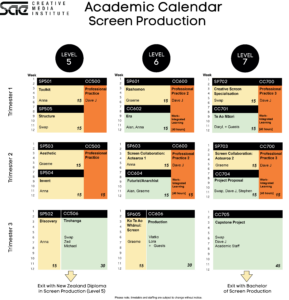
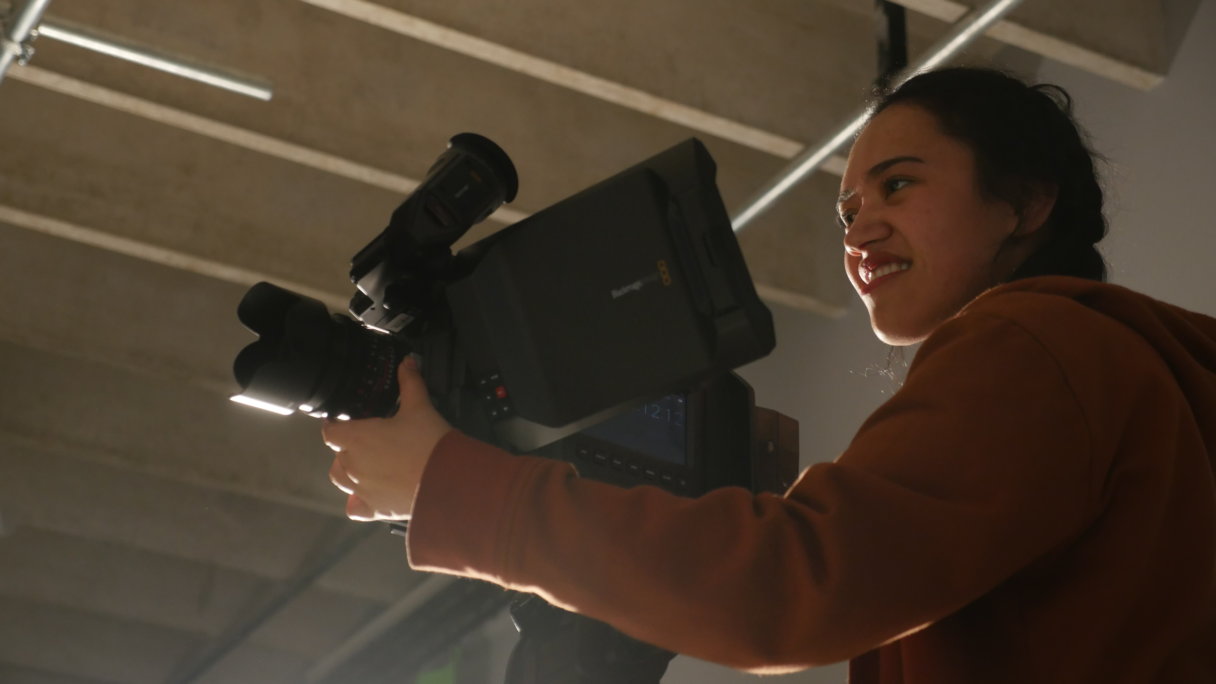
Career Outcomes
What jobs will this course lead to?
- Video editor
- Producer
- Cinematographer
- Colourist
- Director
- Screenwriter
- Visual Effects Artist
- Camera Assistant
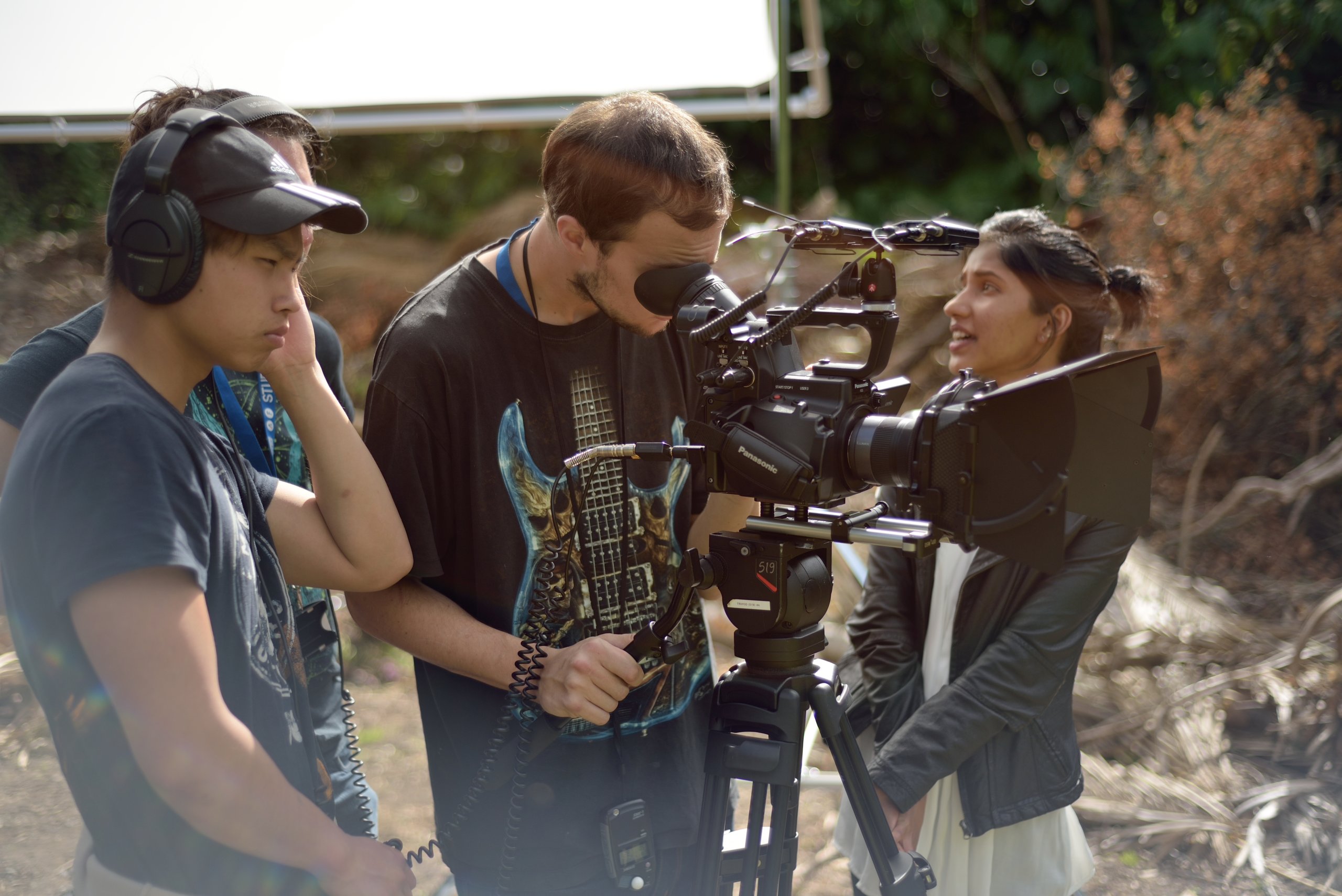
![SAE Logo White [Vert] (2)](https://www.sae.ac.nz/wp-content/uploads/sites/8/2022/04/SAE-Logo-White-Vert-2.png)








